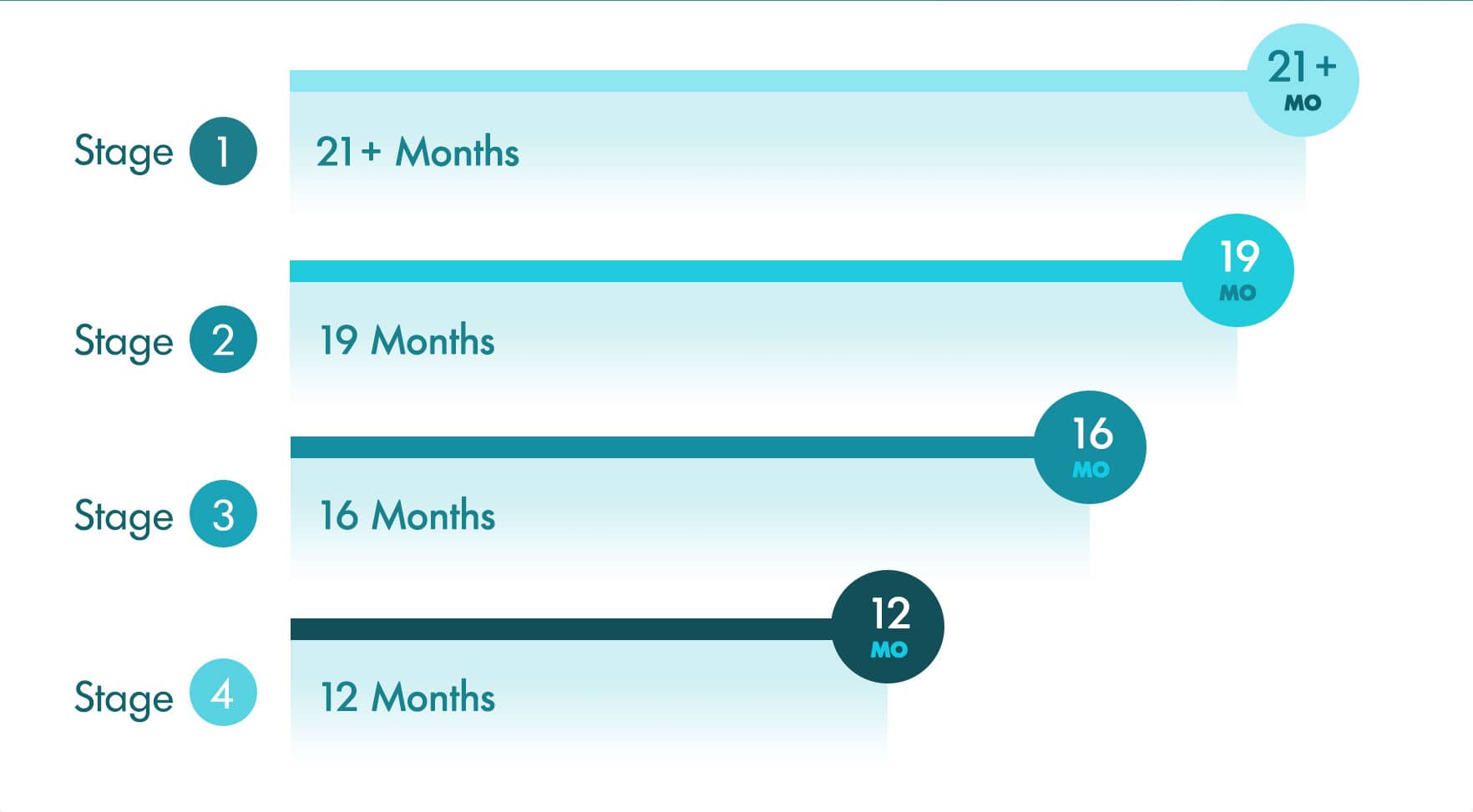Stage 1 mesothelioma is considered early-stage mesothelioma. Cancer cells remain localized and have not spread. Early-stage mesothelioma has no major symptoms and is often detected accidentally. Stage 1 mesothelioma has a better prognosis than later stages and offers the most aggressive surgical treatment options.
Development of Stage 1 Mesothelioma
In stage 1 mesothelioma, cancer cells have not yet spread through the lymph nodes or far beyond the pleural lining.
Early-stage mesothelioma cancer has a better prognosis than cancer diagnosed in later stages. Surgery, radiation and chemotherapy are more effective at controlling stage 1 disease.
STAGE 1 MESOTHELIOMA FACTS
- Two-year survival rate is between 41% and 46%
- Often causes no major symptoms
- Cancer can be removed if the patient is eligible for surgery
- Combination of surgery, chemotherapy and radiation recommended
Defining Stage 1 Mesothelioma
There are three staging systems for evaluating how far pleural mesothelioma has spread. They use somewhat different definitions for stage 1. The TNM staging system is the most commonly used.
The first stage of pleural mesothelioma is divided into two parts: 1A and 1B.
Stage 1A
In stage 1A, tiny tumors develop in one or both layers of the pleural lining on one side of the chest.
Stage 1A tumors were separated into T1a and T1b classifications (T stands for tumor). This division shows if tumors had developed on one or both layers of the pleural lining.
A 2016 study by the International Association for the Study of Lung Cancer found no survival difference between stage T1a and T1b. This lead them to recommend a consolidation. In 2018, the American Joint Committee on Cancer adopted the recommendation.
Stage 1A still includes tumors on one or both layers of the pleura. But it does not separate them anymore into T1a and T1b.
Stage 1B
In stage 1B, the tumors start spreading into other tissues next to the pleural lining. This may include the lung tissue under the lining or the chest wall outside it. Cancer could also spread into the muscle under the lungs (the diaphragm) or the area between the lungs (the mediastinum).
Even if mesothelioma has spread to nearby tissues, a stage 1 diagnosis means the cancer has not spread to any lymph nodes or metastasized to distant sites throughout the body.
Peritoneal mesothelioma does not have an official staging system. However, doctors typically think of it as early-stage cancer if it has not spread beyond the lining of the abdomen.
What Are the First Signs of Mesothelioma?
At stage 1, most patients do not have symptoms. Some are so mild that patients do not feel they need medical attention. Mesothelioma is rarely diagnosed at stage 1 for this reason.
When stage 1 cases are discovered, it is often by accident when a doctor performs an X-ray or CT scan while looking for something else. Other stage 1 cases are caught because a patient with a known history of asbestos exposure received cancer screening.
Patients and doctors often mistake mesothelioma symptoms for more common illnesses such as the flu or pneumonia.
Symptoms are caused by tumors that begin to wrap around the affected lung and constrict it. The patient may experience pain, difficulty breathing or a chronic cough as tumors grow. These symptoms typically begin to appear in stage 3 of mesothelioma, but may appear as early as stage 2 for some patients.
Fluid buildup may cause these symptoms because of pressure on the lung. This condition is a pleural effusion, and it is a common sign of cancer forming in the lining of the lungs.
In 2020, Case Reports described a pleural mesothelioma patient whose first and only sign of the disease was gastric and colonic polyps discovered on an imaging scan. Testing of the polyps revealed they were metastases of pleural mesothelioma.
Is There a Cure for Stage 1 Mesothelioma?
There is no cure for stage 1 mesothelioma or any stage of mesothelioma cancer.
While mesothelioma is incurable, early-stage mesothelioma does have more treatment options. Palliative treatments can ease symptoms. The prognosis for stage 1 mesothelioma is favorable. But it is less favorable for mesothelioma diagnosed in later stages.
In the past, most patients have not survived longer than two years after diagnosis. Some early-stage patients have gone into remission for years after treatment. Remission means the cancer has stopped growing and spreading.
Patients testing for mesothelioma early enough to qualify for surgery have the best chance of achieving remission.
Every day, doctors and researchers work to develop treatment strategies in hope of finding a cure. At the same time, many mesothelioma specialists are optimistic they may soon be able to manage this form of cancer as a chronic disease, rather than a terminal illness.
A number of notable mesothelioma survivors — particularly among those with peritoneal mesothelioma — have outlived their prognosis by years thanks to new treatment techniques.
Survival Rate for Stage 1 Mesothelioma
Stage 1 patients have a better prognosis compared to patients diagnosed at other stages of mesothelioma. Approximately 41%-46% of stage 1 mesothelioma patients survive two years. About 18% survive five years.
For comparison, stage 4 patients usually live around one year, and 7% survive five years.
Survival rates are calculated from the statistics for thousands of patients. The rate shows the percentage of patients still alive a certain amount of time after diagnosis.
This rate explains what happened to a large group of patients in the past. It can only give you a general idea about what to expect from an individual diagnosis in the present.
Life expectancy with stage 1 mesothelioma depends on many factors. These include cancer cell type and the patient’s age and physical fitness level.
Mesothelioma is a rare, complex disease, and every case is different.
How Age Impacts Prognosis for Stage 1 Mesothelioma
Younger patients diagnosed with early-stage mesothelioma often have a better prognosis. They also have more treatment options than patients over 55 years of age.
In general, younger patients have a higher five-year survival rate due to their health and surgical eligibility. Research shows patients over 70 also benefit if they are candidates for pleurectomy with decortication.
The average age of a mesothelioma patient is 69, and about 8% of male patients ages 65 to 74 live for five years or more. Meanwhile, women in the same age group have a 14.1% five-year survival rate.
Stage 1 Mesothelioma Treatment Options
Surgery is the primary treatment for stage 1 patients. Radiation, chemotherapy or both will occur around the time of surgery. These will help improve long-term remission rates. Talk to your doctor to learn how they prefer to sequence therapy because it can vary from center to center.
Patients with localized cancer have the most treatment options available to them. But it also depends on the patient’s overall health. Patients must be in strong health to handle an aggressive treatment plan.
Patients who undergo multimodal therapy may live years beyond the average mesothelioma prognosis.
A 2022 study published in Multidisciplinary Digital Publishing Institute that included stage 1 and 2 pleural mesothelioma patients found multimodal therapy safe and effective at improving survival.
Patients underwent induction chemotherapy, surgery, and postoperative radiation therapy and chemotherapy. The median overall survival was 32.1 months, which is a significant improvement from the average 12-month survival.
Surgery
There are two major surgery options for stage 1 pleural mesothelioma. One removes the diseased tissue around the lung, while the other removes the lung as well.
Which option is best depends on how far the cancer has spread and how much surgery the patient’s body can handle.
Chemotherapy
Pemetrexed (Alimta) and cisplatin are the most common chemotherapy drugs for mesothelioma.
Doctors may use chemotherapy on its own or in combination with surgery for stage 1 patients. After a patient recovers from surgery, they usually receive chemotherapy. The goal is to kill any remaining cancer cells in their body.
Radiation Therapy
Doctors traditionally use radiation therapy after surgery to prevent local recurrence. Radiation therapy after surgery might improve survival rates for certain stage 1 patients.
Clinical Trials and Emerging Therapies
Many early-stage patients in otherwise good health qualify for mesothelioma clinical trials.
These voluntary research studies test experimental drugs and therapies not yet approved by the U.S. Food and Drug Administration for mainstream use. Emerging therapies for mesothelioma include immunotherapy, gene therapy and photodynamic therapy.
 Lifeyet News Lifeyet News
Lifeyet News Lifeyet News





